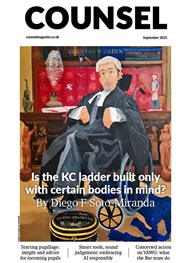*/
Beer: The Singular Case of Donoghue v Stevenson
Matthew Chapman
Wildy, Simmonds and Hill; Hardback (December 2009); £14.99 ISBN: 0854900497
“You must take reasonable care to avoid acts or omissions which you can reasonably foresee would be likely to injure your neighbour. Who, then, in law is my neighbour? The answer seems to be – persons who are so closely and directly affected by my act that I ought to have them in contemplation as being so affected when I am directing my mind to the acts or omissions which are called into question” per Lord Atkin.
Donoghue v Stevenson is one of the primary examples of judicial law-making. It has affected countless interactions throughout the world for decades since it was decided.
In this thoroughly researched homage to the “snail case” Matthew Chapman takes the reader to Paisley in Scotland, where on a Sunday in August 1928, a 30-year-old shop assistant, May Donoghue, sat down in the Wellmeadow Café to enjoy a bottle of ginger beer with a friend.
Matthew Chapman appears to have carefully researched every aspect of the story to provide the reader with all the “flesh” that is omitted from the bones of the law reports. Each of the characters is brought to life, including the noble Law Lords whose duty it was in December 1932 to decide to whom each of us owes a duty of care.
Lord Atkin’s biblical answer to that question has resonated with lawyers for decades since it was first delivered. Together with Lord Macmillan’s pronouncement that the “categories of negligence are never closed”, Lord Atkin’s ruling was initially met with unease from those who feared the floodgates opening. Matthew Chapman analyses the timid response to Lord Atkin’s ruling in the early case law that followed Donoghue v Stevenson. However, slowly but surely the full effect of the landmark judgment began to reverberate throughout the commonwealth jurisdictions of the world.
For the full story, look no further than this book.
Trevor Archer, barrister, 18 Red Lion Square
Donoghue v Stevenson is one of the primary examples of judicial law-making. It has affected countless interactions throughout the world for decades since it was decided.
In this thoroughly researched homage to the “snail case” Matthew Chapman takes the reader to Paisley in Scotland, where on a Sunday in August 1928, a 30-year-old shop assistant, May Donoghue, sat down in the Wellmeadow Café to enjoy a bottle of ginger beer with a friend.
Matthew Chapman appears to have carefully researched every aspect of the story to provide the reader with all the “flesh” that is omitted from the bones of the law reports. Each of the characters is brought to life, including the noble Law Lords whose duty it was in December 1932 to decide to whom each of us owes a duty of care.
Lord Atkin’s biblical answer to that question has resonated with lawyers for decades since it was first delivered. Together with Lord Macmillan’s pronouncement that the “categories of negligence are never closed”, Lord Atkin’s ruling was initially met with unease from those who feared the floodgates opening. Matthew Chapman analyses the timid response to Lord Atkin’s ruling in the early case law that followed Donoghue v Stevenson. However, slowly but surely the full effect of the landmark judgment began to reverberate throughout the commonwealth jurisdictions of the world.
For the full story, look no further than this book.
Trevor Archer, barrister, 18 Red Lion Square
Beer: The Singular Case of Donoghue v Stevenson
Matthew Chapman
Wildy, Simmonds and Hill; Hardback (December 2009); £14.99 ISBN: 0854900497
“You must take reasonable care to avoid acts or omissions which you can reasonably foresee would be likely to injure your neighbour. Who, then, in law is my neighbour? The answer seems to be – persons who are so closely and directly affected by my act that I ought to have them in contemplation as being so affected when I am directing my mind to the acts or omissions which are called into question” per Lord Atkin.


Chair of the Bar sets out a busy calendar for the rest of the year
By Louise Crush of Westgate Wealth Management
Examined by Marie Law, Director of Toxicology at AlphaBiolabs
Time is precious for barristers. Every moment spent chasing paperwork, organising diaries, or managing admin is time taken away from what matters most: preparation, advocacy and your clients. That’s where Eden Assistants step in
AlphaBiolabs has announced its latest Giving Back donation to RAY Ceredigion, a grassroots West Wales charity that provides play, learning and community opportunities for families across Ceredigion County
Rachel Davenport, Co-founder and Director at AlphaBiolabs, outlines why barristers, solicitors, judges, social workers and local authorities across the UK trust AlphaBiolabs for court-admissible testing
Despite increased awareness, why are AI hallucinations continuing to infiltrate court cases at an alarming rate? Matthew Lee investigates
Come in with your eyes open, but don’t let fear cloud the prospect. A view from practice by John Dove
Looking to develop a specialist practice? Mariya Peykova discusses the benefits of secondments and her placement at the Information Commissioner’s Office
Anon Academic explains why he’s leaving the world of English literature for the Bar – after all, the two are not as far apart as they may first seem...
Review by Stephen Cragg KC